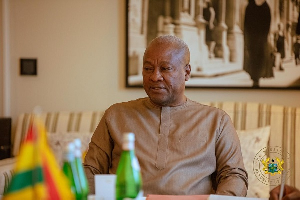All that glitters, they say, is not gold and no condition is permanent and so political observers, who since January 7th, 2005 when Parliament was inaugurated have been full of praise for the new Members of Parliament over their punctuality and high attendance, on Tuesday became disappointed.
This is when it became obvious that both sides of the House had to struggle in vain to raise the numbers for the purposes of adopting a motion on the floor. The situation threw the ships on both sides into open display of their mobilization skills but to no avail, as their respective members, who were badly need to out sway the opposing side, were simply unavailable.
But quite apart from the situation metamorphosing into a drama of who wins the day, one intriguing concern that it has raised is the exposure of what can best be termed as the Ghanaian Parliament's version of ghost attendance.
Investigations by The Independent in Parliament over Tuesday's attendance have revealed a stunning trend of attendance that cannot be justified, in view of the vast difference between what is recorded in the attendance book and the actual physical number of MPs who take part in parliamentary proceedings on the floor of the House and at the Committee level. Political observers will recall that on Tuesday, Parliament witnessed one of its usual hot debates over a motion to adopt the report of the Joint Committee on Finance and Trade, Industry and Tourism on the Support Agreement between the Government of Ghana and KHI Ghana 01 Limited, in relation to the Ambassador Hotel in Accra.
The motion, which was moved on behalf of the Joint Committee by Nana Akomea, Member of Parliament (MP) for Okaikoi South and chairman of Committee on Trade, Industry and Tourism, sent the House into polarization along party lines, with each divide taking an entrenched position over the motion. While the report sought to portray the agreement as an international one since it was between the Ghana Government and the Saudi Prince's company, the position which was upheld by the Majority in Parliament; the Minority rejected that contention with the argument that since the Saudi Prince's company, the position which was upheld by the Majority in Parliament; the Minority rejected that contention with the argument that since the Saudi Prince's company has been registered in Ghana, the agreement does not have an international character.
The Minority in its contribution to the debate on the motion said, if the House should adopt the report in that form, it would be setting a bad precedence and called for its amendment, but the majority held a contrary view.
The ensuing debate that raged on for a long time finally ended in a head count of MPs who support the adoption and those who oppose it. The Majority won the day with 76 people voting for the adoption, while the Minority lost with a slim margin of one; 75 of them were present to vote. But while the issue seems to have been settled with the vote, one very pertinent question it raised was the abysmal attendance of MPs on that day.
The investigations revealed that while both sides of the House struggled to raise the 151 to take part in the voting, the parliamentary register recorded 187 MPs as present, which is the number, expected to take part in the activities of the House. Taking into consideration the records as per the register, the number of MPs who were physically present to take part in the voting fell short by 36 MPs, who whereabouts at the time of the voting could not be determined.
Politics of Thursday, 21 July 2005
Source: The Independent
















